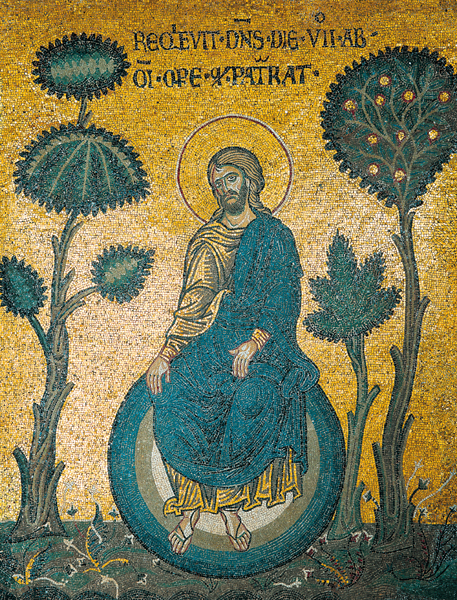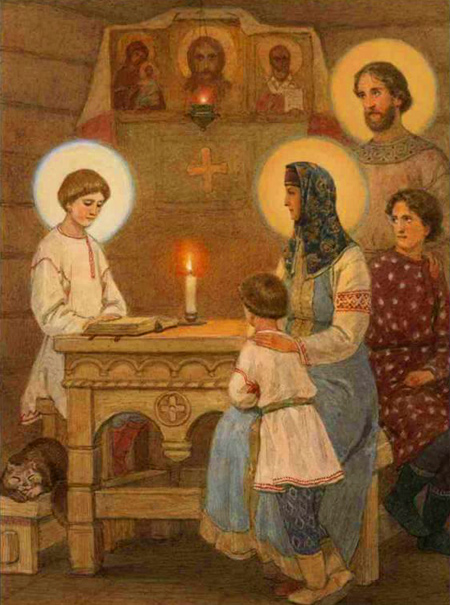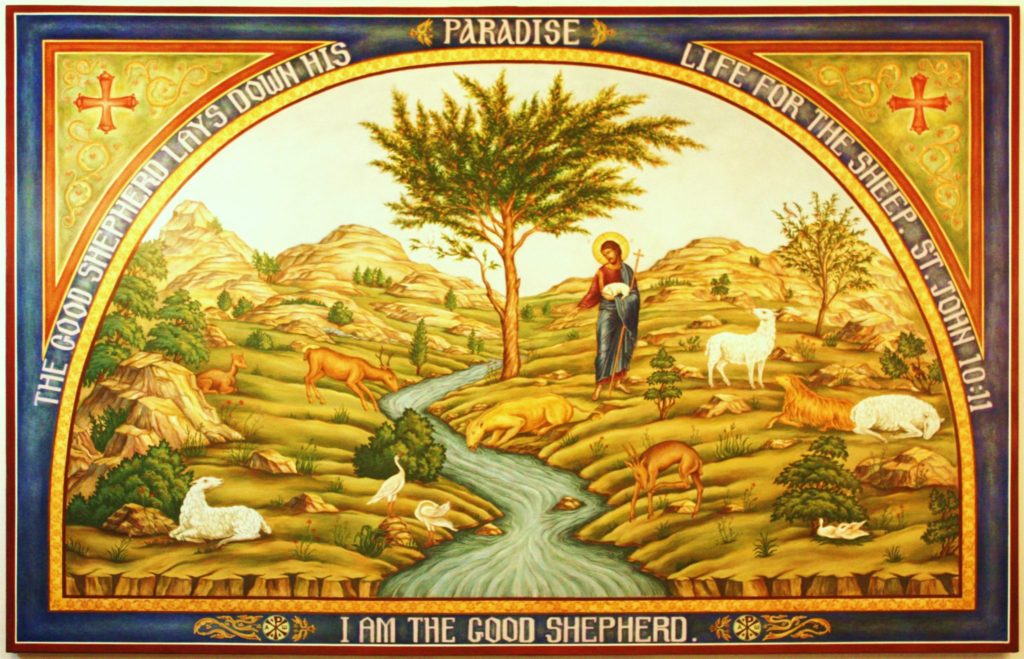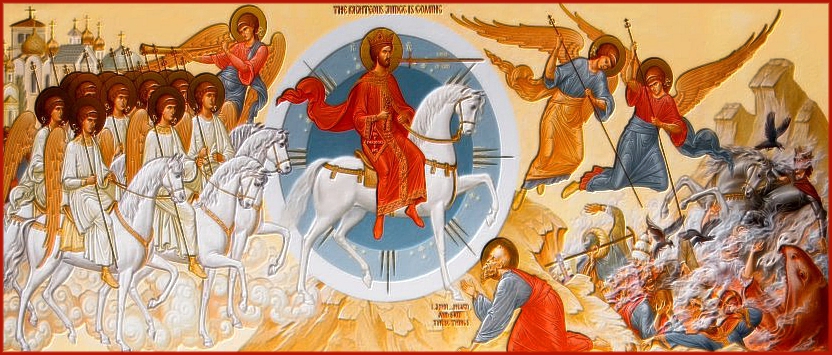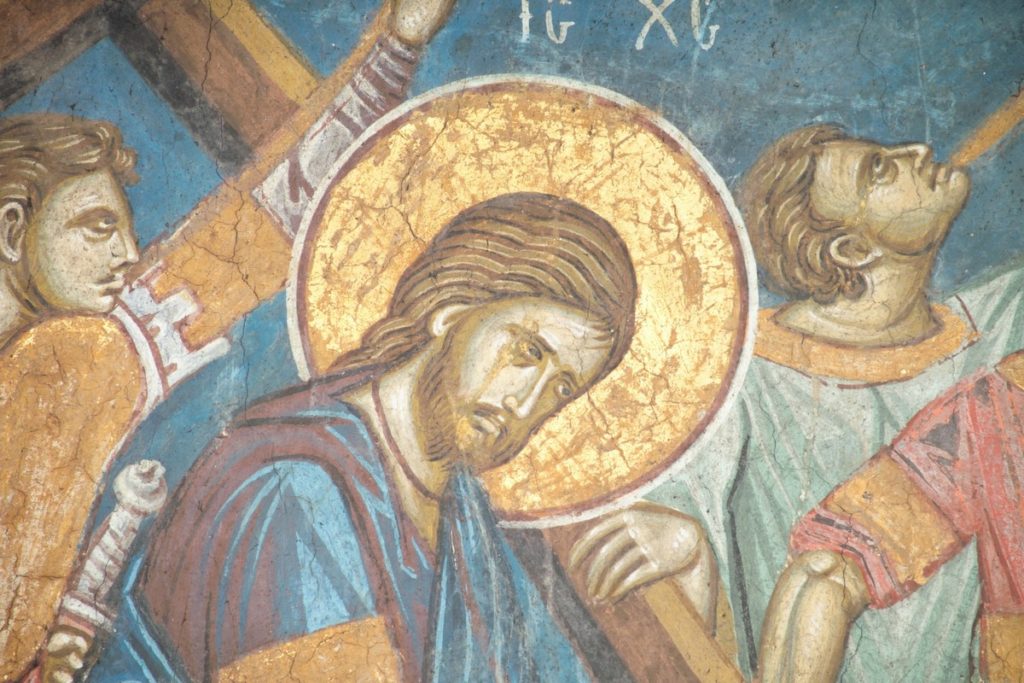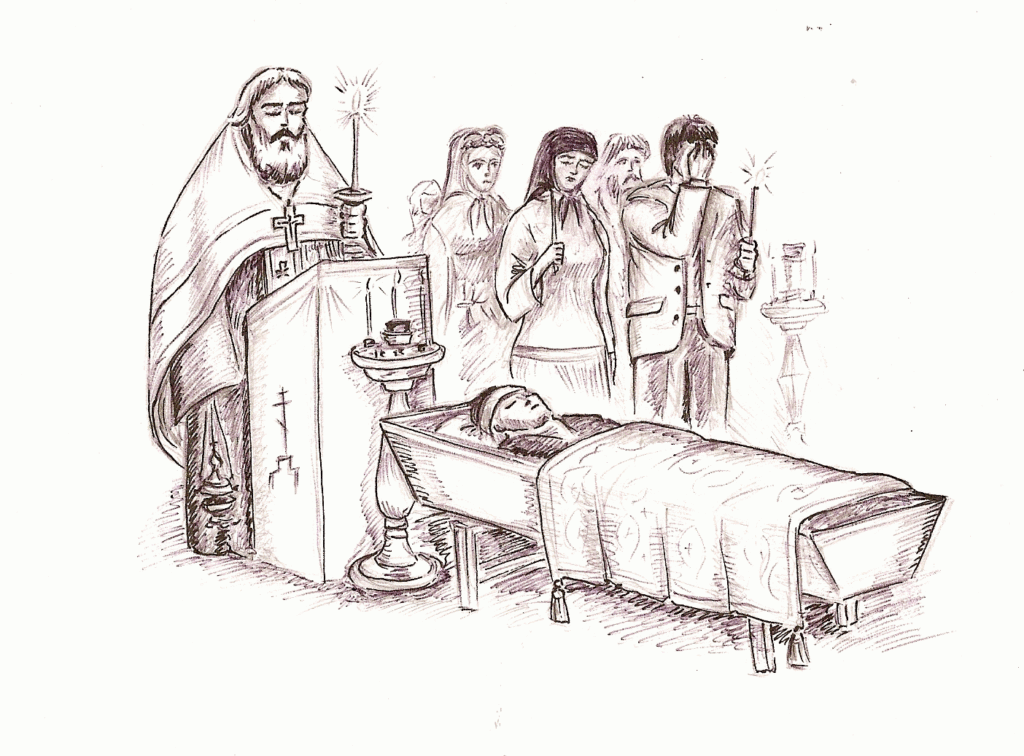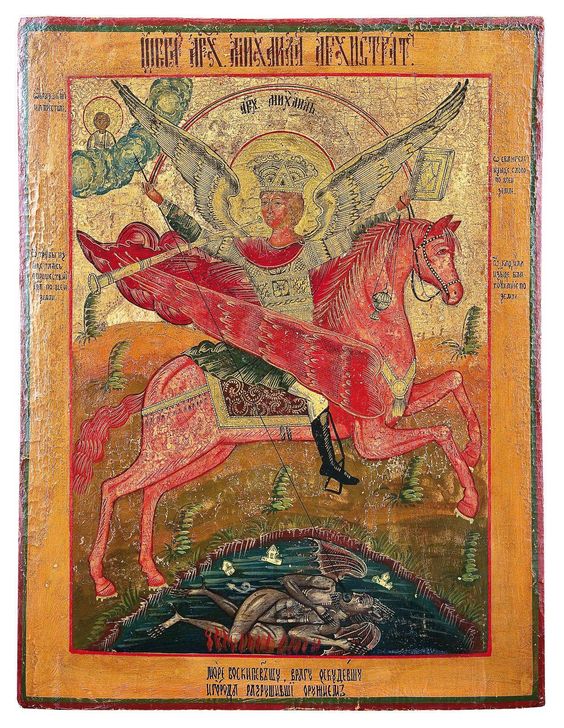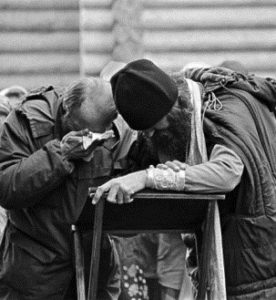You can listen to an audio podcast of this blog post at https://www.spreaker.com/user/youngfaithradio/osc74
Heartfelt thanks to our benefactors! May the Lord bless you and your family as we begin the Holy Apostles’ Fast of 2023. My parish is small, and though they are self-sacrificing, generous, and supportive according to their size, they cannot provide a full-time income for a family today. Your gifts, dear benefactors, enable me to write in my spare time, and to do unremunerative mission work in addition to my parish work, instead of working at a secular job.
I have an important announcement to make: We hope to launch a Substack site in the near future, as a way of making our work known to a wider audience and in order to offer an alternate way to give donations, using the subscription function on Substack. Our Spreaker channel and the Orthodox Truth blog will remain active, but future essays and podcasts will also be published on the Substack site. I do not plan to put any of my work behind a paywall on Substack; the subscription function will be used as a method for donations, not payment in return for intellectual productions. “Freely have ye received; freely give.”
Our donors may also continue to use our PayPal account at frstevenallen@gmail.com or send us a check at 34 Greenwood Avenue, Hillsdale, Michigan 49242. If you wish to receive a receipt for tax purposes, you can contact me at that email address, and we can arrange it through your making a donation to our parish.
Introduction – Our Situation and What Is Called For
It is obvious that those who hold the reins of earthly power in all sectors of society today throughout the world – in government, science so-called, medicine, the media, education, the security apparatus, etc. – hate Our Lord Jesus Christ, worship Satan, and are striving mightily to assist the demons in our temporal and eternal destruction. By now this should be beyond need of demonstration to anyone paying attention, much less to the remnant of Orthodox Christians who have retained a comprehensive Orthodox worldview and evaluate current events from that perspective. There are Orthodox Christians – including, or, rather, especially bishops and priests – who stubbornly refuse to recognize this, but that does not change the reality. Beholding this self-chosen blindness on their part only reinforces our understanding that there is so much spiritual deception (plani/prelest) both outside and inside the Church today, that it is a great miracle when anyone today remains on the path to salvation. God, however, loves to work miracles for His chosen, and we must learn how to dispose ourselves to receive the miracle of our salvation, with all-daring hope in His mercy. How can we do so?
When the men of old constructed great fortifications, they usually designed them with successive rings of defense: an outer wall, one or more inner walls, and, finally, the keep, a central stronghold of great strength, designed as the last sanctuary and place of defense when all the outer defenses had given way. We may apply this plan of the castle as an image of our life in society: The outermost defense consists of the traditional institutions of the state, which in Christian societies were designed to protect the next line of defense, which consisted of the outward institutions of the Church. These institutions – the hierarchy, clergy, national and local synods, etc., with all their great array of instruments in the form of income-producing property, in the form of magnificent buildings for worship, administration, education, care for the needy, etc., in the form of canonical rules and structures, in the form of great art, literature, and all the rest – all of this was designed to protect Orthodox life at the level where it is lived, in the local monastery, in the local parish, and in the home. These local structures in turn formed another line of defense for the monastic brotherhoods and families they fostered. The brotherhoods and families, in turn, formed a line of defense for the individual soul. Finally, at the center of all these concentric castle walls, there is the innermost keep, the final refuge: The soul itself, in the center of which is the heart, where, if Christ the King is enthroned as Master, He will triumph in the last battle that occurs when all the other defenses are thrown down. Ultimately He is the only defender that we need.
I daresay that those of us who have lived long in this world and yet somehow – God alone knows how – still remain in possession of our rationality, much less our Faith, understand that the walls of defense of the Christian state and the traditional Church institutions have been destroyed, and, unless we live to see the Lord raise up the last and greatest Orthodox Tsar prophesied by our recent elders and saints, we will not see these walls rebuilt in our lifetime. We need not rehearse the story of the great apostasy of the various Antichrist revolutions which achieved its greatest triumph in the Bolshevik revolution, a revolution which has not ended. It has continued unabated until this day, and it now threatens to engulf America entirely. Without analyzing all of the details, it is enough to understand that we cannot rely on the state to protect the Church and that, in fact, the power of the state is, in general, being devoted to Her destruction. Likewise, it is enough to understand that every one of the historic patriarchates and great national Church institutions have been internally destroyed; though the outward semblance remains, they are empty shells. This has occurred somewhat by the actions of the state, but above all by the apostasy of the church hierarchy. Truly, as St. John the Theologian prophesies in the Apocalypse, the stars – that is, the bishops – have fallen from the skies.
Therefore our outermost castle defense now consists of tiny and makeshift church institutions: provisional church administrations headed by the few remaining right believing and confessing bishops, with sketchy organization, few resources, and constantly shifting memberships and alliances, with little capacity – beyond the minimum of simply preserving the apostolic succession – to help the local institutions of monastery, parish, and family There are valiant bishops, clergy, and lay administrators who have remained faithful. They are carrying on the fight; they are still manning these crumbling walls though the overwhelming majority of their former colleagues have abandoned the fight and joined the enemy. This takes a lot of courage. So these men need and deserve all the support we can give them. We cannot expect them to provide all that the great institutions of the past provided us, and we should not reproach them when they cannot do what is beyond their strength. Simultaneously, we must do all in our power, God helping us, to strengthen the monastic life, local parish life, and family life, realistically and humbly, within the limits imposed by our situation: Every one of us must become an active warrior for the victory of the Church, and being a passive, nominal Orthodox Christian is not an option.
Finally – and this is the subject of my talk today – it is absolutely urgent that each of us take refuge daily in the innermost keep of the soul, by directing the attention of our mind to the heart, acquiring the habit of continual spiritual attention, combatting our logismoi – the psychic flow of our mental sins or merely distracting and useless thoughts – and concentrating the mind in the heart, with the single thought of the sweetest name of Our Lord Jesus Christ, Who alone can and will triumph over the enemies fighting against us.
The Persecution Is Now
Everyone in the English speaking True Orthodox world is – or should be – familiar with Russia’s Catacomb Saints, by Professor Ivan M. Andreyev and Hieromonk Seraphim (Rose). The book’s dedication reads thus: “This book is dedicated to the Christian Martyrs, Today in Russia, Tomorrow in America.” And many of us are familiar with the prophecy of the Elder Ignatius of Harbin: “What began in Russia will end in America.”
It does not take much imagination to observe what is going on today in this country and conclude that we are in the early stages of an official and open persecution of Christians in the United States. We observe the events and the trends, we worry about it, we may get caught up in the Internet debates about this or that aspect of the problem – engineered economic crises enabling a few criminals to transfer the wealth of entire nations into their own bank accounts, the “woke” brainwashing in the universities, principled people losing their jobs and businesses during the great Covid deception and the looming prospect of another such fake crisis enabling more persecution of the same kind, parents getting arrested by the police for standing up at school board meetings to protest their children’s being initiated into abominable sexual practices by their teachers, and so forth.
So we worry, we argue, we get upset…perhaps – let us be honest – we are actually entertained, in some sick way, by the whole thing: we enjoy being angry about it and verbally abusing the people responsible for it. But are we really doing anything serious to ready ourselves for the moment when we are faced with the necessity to give up something in this world – friends, school, job, home, health, perhaps life itself – in order to save our souls? Are we even able to recognize such moments when they comes? Has this moment perhaps already come and gone, and we did not notice? In other words, do we even possess the discernment to recognize when such a choice is before us? It is quite possible to lose one’s salvation by an incremental series of compromises and not realize we have done so till we die and the demons come to take the soul to hell. The great and obvious crisis – the dramatic moment when the Bolshevik thug points a gun at your head and orders you to choose between Christ and Lenin – that moment may never come. It is possible to go to hell simply by getting into the habit of saying to those who are peddling the lies, “Maybe you are right,” in order to avoid an earthly loss of some kind or simply the momentary discomfort of an emotional conflict. To borrow the apt image T.S. Eliot employs in the concluding lines of “The Hollow Men,” it is more likely that we shall perish not with a bang but with a whimper.
So the persecution is now. Though aspects of the outward persecution are certainly in place already, and we are feeling the pressure, and some of our brethren have already – and nobly – paid an outward price for their faithfulness, the persecution is still chiefly mental and spiritual, and it is so intense that there are days when you can feel that your are losing your mind. The Soviets set up mental hospitals where they would intern the “counter-revolutionaries” and “enemies of the People” in order to poison their minds with drugs and make them crazy. Today the Neo-Soviets in America have turned the entire country into an insane asylum, in which the most insane and most criminal inmates of the asylum are the people in charge. The persecution was crude and obvious in the Soviet Union; it is much more subtle now, and it has been put into place slowly and patiently, chiefly through deception rather than through violence, while very few people even noticed. We turn around and now we suddenly notice that the America of ten years ago – much less 50 or 100 years ago – has vanished, and we are living in a sinister version of Alice in Wonderland where nothing that the people in power say makes any sense. If we give in and surrender our minds to endless fascination with the ever changing mental kaleidoscope of the false mainstream narrative and the myriad false competing narratives offered as alternatives, our minds will be demonized without much effort on the part of the demons. The demons can practically take a vacation.
What is the Solution?
There are steps we must take to preserve our souls, both in our dealings with the world out there and with our inner spiritual struggles. Today I want to talk about the primary battle, which is to preserve the innermost keep of the castle of our lives, that is, the mind and heart. So today let us speak of the constitution of our inner world and how to preserve it.
The Universe Within
In his Handbook of Counsel, St. Nicodemus of the Holy Mountain talks about each man possessing within himself something greater than the entire visible universe. Here’s what he says:
God first created the invisible world and then the visible world. After everything else He creates man, of an invisible soul and a visible body. Thus He renders him like a cosmos – not a small cosmos within a great one, as the philosopher of Nature Democritos has said, and as other philosophers opine, calling man very pettily only a microcosmos and limiting his dignity and perfection to this visible world; no, God renders man a great cosmos within the small one. Man is a megalocosmos through the multitude of powers he contains, especially intuitive and discursive reason and the will, which the physical universe does not have. For this is what Gregory the Theologian says: “He places man on the earth like a second cosmos, a great cosmos within a small one” (Discourse on the Nativity and Pascha); a cosmos adorning both universes, the visible and invisible, according to the divine Gregory of Thessalonica (Discourse on the Entry of the Theotokos, I); a cosmos which connects the two ends of the world above and the world below, and makes it clear that the Creator is one, according to Nemesios. – Handbook of Counsel, 2nd Edition, 1885, translated by Constantine Cavarnos and quoted in volume 3 of “Modern Orthodox Saints,” St. Nicodemus the Hagiorite
This thought – that what is inside of us is greater than what is outside of us – has great power to console us and to motivate us when we are faced with the tyrannical demands of the outer world. Nothing the world offers can give us greater happiness than that which we can possess within, when the powers of the soul are enlivened by the grace that we receive from the Orthodox Holy Mysteries and we follow the path of inner perfection as taught by the Holy Fathers. Always remember: God may allow bad people to take away from you every visible thing you have – family, property, and even your temporal life. But He will never allow them to take away your soul, if you choose not to let them. The more you will cultivate your inner life, the more secure you will be in the peace that the world cannot give and cannot take away (John 14:27: “Peace I leave with you, my peace I give unto you: not as the world giveth, give I unto you. Let not your heart be troubled, neither let it be afraid.”). And along with this peace, you will grow both in discernment to know what is true from what is false and in the power of the will to confess truth and to deny falsehood.
Russia’s Catacomb Saints as a Moral Catechism
I cannot emphasize strongly enough that all of us should own at least once copy of Russia’s Catacomb Saints study it periodically. It is out of print and will probably never be re-printed, at least not in its original form, and all of us should download it or scan it and share it as widely as possible both in hard copy and digital format.
(It is also available now in hardcover from Lulu: https://www.lulu.com/search?page=1&q=Russia%27s+Catacomb+Saints&pageSize=10&adult_audience_rating=00.)
A lot more data about the New Martyrs of Russia has, of course, become available, since the so-called fall of Communism, but the enduring value of Russia’s Catacomb Saints, published in 1982 when the Soviet Union still existed, lies in the interpretation given to the amount of data that they had, by the authors Dr. Andreyev and Fr. Seraphim. A small amount of data presented with the right interpretation, especially in the spiritual realm, in which the quantity of data is simply not that important, is always far preferable to a large quantity of data presented with muddled, misleading, or outright false interpretations. What Russia’s Catacomb Saints still offers us today is a vivid catechism in the acquisition of the discernment of the spirit of Antichrist. One should not only study – if possible, memorize – the stories in the book; one should immerse oneself in the spirit of the book, which is ineffably fragrant with the otherworldly humility of wisdom, a quality generally lacking in many of the slick and shiny publications pouring out today from officially approved Orthodox publishing houses.
Russia’s Catacomb Saints is over 600 pages long, and obviously we do not have time today to talk about all of it. I have chosen the stories of three personalities who are described there to help us gain some insight into the absolute necessity for developing the inner life of prayer in times of persecution: The author I.M. Andreyev, New Martyr Matushka Maria of Gatchina, and New Hieromartyr Archbishop Pachomius of Chernigov. Andreyev teaches us about the distinct existence of the spiritual realm as opposed to the psychosomatic, Matushka Maria teaches us about the ability to be joyful while living completely within the soul with no physical activity whatsoever, and Archbishop Pachomy teaches us that even if our discursive reason is destroyed by stress and persecution – even if we seem outwardly to have lost our minds – it is entirely possible that the noetic life of the spiritual reason, the life of prayer and holiness, can continue in the depths of the soul, if that life has been cultivated prior to losing one’s outward sanity.
Fr. Seraphim Rose’s short biography of Professor Andreyev, entitled “About the Author,” at the beginning of Russia’s Catacomb Saints, is not only an engaging introduction to an outstanding Orthodox intellectual of the 20th century. It presents a paradigm of conversion consisting of an ascent from materialism through idealism to a thoroughly Orthodox, patristic worldview, not merely as an intellectual position, but rather as a heartfelt conviction permeating and determining all of a man’s thoughts, feelings, and actions, at the cost of great sacrifice while yielding great joy. The passage in the biography illustrating best the thoroughness and the meaning of Andreyev’s conversion relates the gift of spiritual insight he received while praying to St. Seraphim at Diveyevo in 1926. I shall quote this passage in full, because it is so important:
Having come to true Orthodoxy, Andreyev finally, on a pilgrimage to St. Seraphim’s Diveyevo Convent, had an experience which he describes as his “spiritual birth.” It was the custom for pilgrims to Diveyevo to remain at least 24 hours in the convent and perform there the “rule” laid down by St. Seraphim himself: to walk around the “canal” of the Mother of God (the path around the convent), saying a special rule of prayer by prayer-rope, praying for all one’s relations and close ones, and at the end expressing one’s most heartfelt, most needed desire, which would unfailingly be granted, according to one’s desire. Andreyev thus describes his experience:
“When, at the end of the third circuit of the ‘canal,’ having performed the whole rule, I wished to express my heartfelt desires, something miraculous occurred to me, evidently by the great mercy of St. Seraphim. I was suddenly gripped by an entirely special, warm, and fragrant joy – an undoubting conviction with my whole being of the existence of God and of an entirely real communion prayer with Him. And it became entirely evident and clear to me that any request for anything earthly would be equal to the prayer: Lord, depart from me and deprive me of Thy wondrous gift…And inwardly I fervently addressed God, ‘O Lord, give me nothing, takeaway from me all earthly prosperity, but only do not deprive me of the joy of communion with Thee, or, if it is impossible to preserve this always in our life, then grant me remembrance of heart, grant me the possibility of preserving to death the remembrance of this present blessed minute of the sensing of Thy Holy Spirit!’
“The next day we went to Savor. We venerated the relics of St. Seraphim with great emotion, with spiritual fear and reverence. I sensed that I had been spiritually born the previous day at Diveyevo. Everything had become new within me. Previously I had not understood such a simple truth, that spiritual things are more distinct from those of the soul than the latter from bodily things. But now I understood this all well. Within, in the depths of my soul, it was quiet, calm, joyful. The outward miracles at the shrine of St. Seraphim, which occurred before my eyes, did not astonish me. All this seemed simple and natural…
“My whole life after my pilgrimage to Sarov Monastery changed. The Lord took away from me, in accordance with my prayer at the canal, all earthly goods, but He preserved forever in me the remembrance of that moment when, in His limitless kindness, by the mercy of the Most Holy Mother of God and the prayers of St. Seraphim, I a sinner, totally undeservedly, was vouchsafed to experience in myself the quiet, joyful, gentle, and fragrant wafting of the Holy Spirit of the Lord.” (“A Pilgrimage to Sarov and Diveyevo in 1926,” in Orthodox Way, 1953, pp. 20-21, 25). – Russia’s Catacomb Saints, pp. 30-31
The central statement in the passage above is this: “…such a simple truth, that spiritual things are more distinct from those of the soul than the latter from bodily things.” In Orthodoxy, and only in Orthodoxy, man has direct access to spiritual life and authentic spiritual experiences, properly speaking, while in other religious systems, including those outwardly similar to Orthodoxy like old-fashioned Catholicism, even the highest experiences of the most outstanding personalities are psychic not spiritual – they are psychiko not pneumatiko, dushevni not dukhovni – and the difference between the psychic and the spiritual is immeasurably greater than the difference between bodily and psychic experiences. The fact that we are Orthodox and thereby have access to that which is genuinely spiritual is not due to any worthiness on our part – we all know Catholics and Protestants, or even non-Christians, who seem to be better people than we are. It is not our worthiness that bestows true spiritual experience, but rather the uncreated grace of God acting through faith and baptism in the spiritual intellect and the spiritual heart (which together the Fathers call the nous), that is given to those of orthodox faith and is not given to those outside the Church, by the pre-eternal determination of God’s sovereign wisdom and will and not according to any human calculation. This realization should arouse in us the most earnest contrition for our ingratitude in the face of such an undeserved and immeasurable gift transcending all other human joys, and it should inspire us to do whatever is necessary – to resolve, like Dr. Andreyev, to give up everything if necessary – to obtain the infinite gift offered to us and to preserve it throughout our lives, unto death. This gift enabled Andreyev and countless others like him to endure the most terrible sufferings in the trials of the 20th century and to be faithful to Christ all their lives. It can enable us to do so in the 21st century as well.
The great podvig of the nun Maria of Gatchina was to practice continuous and attentive prayer with unremitting patience while lying completely paralyzed from an extreme form of Parkinson’s disease, and she received the gift of the Holy Spirit to console the suffering people who came to her seeking counsel and relief, in an immediate and obviously miraculous fashion. Here is what Andreyev writes about her:
…her whole body became as it were chained and immovable, her face anemic and like a mask; she could speak, but she began to talk with half-closed mouth, through her teeth, pronouncing slowly and in a monotone. She was at total invalid and was in constant need of help and careful looking after. Usually this disease proceeds with sharp psychological changes (irritability, a tiresome stubbornness in repeating stereotyped questions, an exaggerated egoism and egocentrism, manifestations of senility, and the like), as a result of which such patients often ended up in psychiatric hospitals. But Mother Maria, being a total physical invalid, not only did not degenerate psychically, but revealed completely extraordinary features of personality and character, not characteristic of such patients: she became extremely meek, humble, submissive, undemanding, concentrated in herself; she became engrossed in constant prayer, bearing her difficult condition without the least murmuring. As if as a reward for this humility and patience, the Lord sent her a gift: consolation of the sorrowing. Completely strange and unknown people, finding themselves in sorrows, grief, depression, and despondency, began to visit her and converse with her. And everyone who came to her left consoled, feeling an illumination of their grief, a pacifying of sorrow, a calming of fears, a taking away of depression and despondency. The news of this extraordinary nun gradually spread far beyond the boundaries of Gatchina. – Russia’s Catacomb Saints, pp. 85-86.
(Holy New Martyr Maria of Gatchina was arrested in 1930 for her refusal to accept the Declaration of Metropolitan Sergius, and she died briefly afterwards – probably murdered – in a prison hospital.)
There are many insights to be gleaned from this saint’s amazing witness, but I would like to point out one aspect of this extraordinary story that applies directly to our electronic media-addicted generation: Matushka Maria had very little or no mental stimulation or variety of experience from outside sources, but she did not go insane from boredom. On the contrary: she attained the heights of wisdom and understanding, enabling her to give immediately effective counsel to all those who came to her. Remember what St. Nicodemus said above: Our inner world is immeasurably larger than the outer world. Our souls are constantly functioning in the invisible universe, though because of our worldliness and inattentiveness, we do not perceive it. As we grow in prayer and inner attention, we find that our interior experiences are actually more attractive than our outer experiences, and therefore we find it less and less necessary to be distracted in order to be happy. So it is critical to attain an active and attentive inner life, not only in order to acquire discernment about the lies and delusions of the present but also to prepare for that day in the future when we may be severely disabled like St. Maria or locked in solitary confinement in a prison cell, or simply be cast out and have no friends and no social life, because of our loyalty to Christ. We need to start now; today is the day of salvation. We do not know what tomorrow will bring.
The sufferings of Holy New Hieromartyr Pachomius, Archbishop of Chernigov, the spiritual father of our own Archbishop Leonty of Chile, of blessed memory, constitute for me the most poignant account in Russia’s Catacomb Saints. Vladika Pachomy’s sufferings – both from the situation of the Church and from his own time in the Gulag – were so terrible that they caused him to have a mental breakdown, and he was released for a time to the care of his sister Vera. The poor man would have periods of lucidity, during which he realized the extent of his mental infirmity, and he would actually try to escape his sister’s house, in order not to burden her. Finally his sister could no longer take the stress of the situation, and she decided to take her brother to a mental hospital. Of course, in Soviet times, this often meant a death sentence, for they would simply euthanize helpless people, as we see going on increasingly today in the so-called free West, and, indeed, St. Pachomius suddenly died only two months after entering the hospital. Here is how his nephew describes the scene in which he last saw his uncle, Vladika Pachomy:
…The winter had settled in; everywhere there was a lot of white glistening snow. My uncle came down dressed in a warm overcoat with a black Mount Athos monastic cap on his head; he had a large black beard that had not ye turned grey. He looked at me with a quiet gaze. He did not bless me for we were afraid; he just embraced me and was gone. A strange sweet feeling came over my heart; it settled in like some beautiful melancholy music that lingers on even though the sound has died long ago. That was all I saw of my uncle New-Martyr Pachomius. – Russia’s Catacomb Saints, p. 203
How could the boy feel a sweet fragrance and beautiful music embracing his heart in such a dark moment? Here was his mad uncle going off to an insane asylum and probably to imminent death at the hands of evil men. What he felt must have been something that transcended the physical situation as well as his uncle’s psychic state. He perceived the grace that still exuded from a holy soul and a holy body. The spiritual powers that the bishop had stored up through years of the sacramental life, of podvig, of inner prayer, of service to the Church and, finally, of suffering as a righteous confessor of Jesus Christ, still acted within the depths of his soul, in his spiritual intellect, though his discursive intellect was so profoundly damaged. I have had similar experiences with pious people suffering from Alzheimer’s disease: For months they did not speak; they did not know their own children; they could not remember their own names. But when the caregiver would say, “Father has brought you Holy Communion, “ they would make the Sign of the Cross and open their mouths. The spiritual mind knew what the worldly mind could not perceive.
One day any of us could be reduced to such a state of outward helplessness, in body and in mind, either by disease or by the machinations of the demons and of evil men. Let us begin today to store up spiritual riches through an attentive inner life, through frequent and careful confession and Holy Communion, and in general gradually stripping ourselves of our earthly attachments, curiosity, desires, and fears, while spending more and more time in prayer, in spiritual reading, and in quiet labors for God and neighbor. We trust that the All-Merciful Lord will not abandon us, and that by His undeserved gift of grace, we will receive and always remember the sweet visitation of the All-Holy Spirit, which will sustain us unto death and good hope at the dread judgment seat of Christ.
I would like to close with words from an inscription New Hieromartyr Pachomius of Chernigo once wrote on his portrait given to his cell-attendant Novice Basil, the future Archbishop Leonty of Chile:
Dear Vasya F.,
‘Paradise is the love of God from which Adam fell; and since then joy did not encounter him even though he labored and tilled the hard earth.’
‘He who has acquired love, tastes Christ every day and every hour and becomes immortal through it. Love is much sweeter than life. He who has acquired love becomes clothed in God Himself.’
‘The glory of the body is submission to chastity through the help of God. A chaste body in the sight of God is worth more than a pure sacrifice.’
From St. Isaac the Syrian.
(Signed) Unworthy Archbishop Pachomius
Through the prayers of St. Isaac and all of our Holy and God-bearing Fathers, and all the New Martyrs and Confessors of Russia, O Christ God, have mercy on us and save us. Amen.

